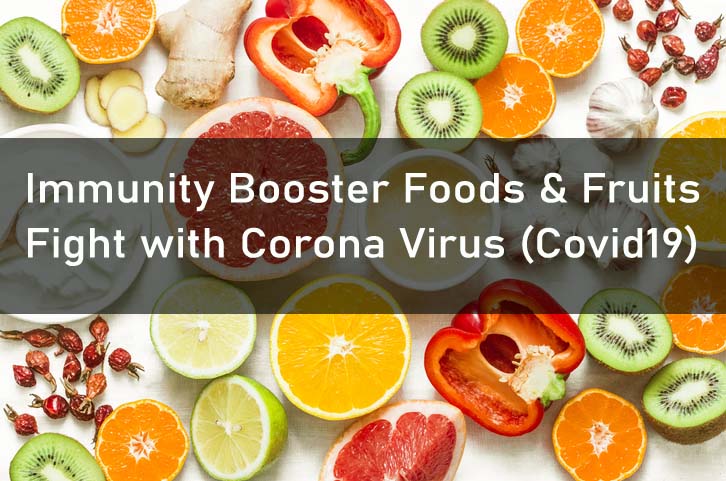Since coronaviruses (COVID-19) have affected communities around the world, many have wondered whether there are some steps they can take to stay healthy. Preventive measures — such as wearing a mask, getting vaccinated when eligible, washing hands, avoiding contact with sick individuals, and good hygiene — can help reduce the risk of COVID-19 and other viruses, bacteria, and pathogens.
In addition, however, there is evidence that nutrition and other lifestyle measures affect immunity and susceptibility to infectious diseases. Whether these measures affect the sensitivity of COVID-19 or its clinical course is not yet known. However, there is every reason to put what we know about the use of foods and immune defenses.
Here we going to list some Immunity Booster Foods and Fruits :
1. Citrus Fruits
Almost all citrus fruits are high in vitamin C. Vitamin C is believed to increase the production of white blood cells, which are important to fight infection. Because your body does not produce or store it, you need daily vitamin C for continued health. The recommended daily amount for most adults is:
- 75 mg for women
- 90 mg for men
Popular citrus fruits include:
- grapefruit
- oranges
- clementines
- tangerines
- lemons
- limes
2. Tulsi
Tulsi is another miracle herb which is very much liked by Ayurveda. This scented leaf may be your primary line of defense against COVID-19. Tulsi or Tulsi is a powerful germicide. Due to its phytochemicals and antioxidants, it can effectively detect and destroy germs, viruses and bacteria as soon as it enters your body.
Chew some leaves first thing in the morning. You can also mix a few drops of boiled water with basil leaves in your meal.
You should read : Health Benefits of Tulsi
3. Neem
Since ancient times, neem has been respected and widely used as an immune booster. It is very effective in protecting the body from attacks of harmful pathogens due to its anti-viral, anti-bacterial and anti-fungal properties.
Neem can also keep your blood clean. It purifies the blood by removing toxins and it can strengthen immunity.
You should read : Health Benefits of Neem
4. Moringa
Moringa is an herb that can overcome many health complications. And during the COVID-19 epidemic, it should be your immune-strengthening herb.
So what makes Moringa such a powerful immunity booster? It also contains 7 times more vitamin C than oranges. Vitamin C is the main nutrient needed to make our body strong immunity.
Not only this, Moringa also contains some other important nutrients that strengthen your cells, muscles, tissues and help your body to heal. Eat moringa for high levels of potassium, iron, calcium and amino acids.
5. Turmeric
You may know turmeric as a major ingredient in many curries. This bright yellow, bitter spice has also been used for years as an anti-inflammatory in the treatment of both osteoarthritis and rheumatoid arthritis.
Research suggests that high concentrations of curcumin, which gives turmeric its distinctive color, may help reduce exercise-induced muscle damage. Curcumin looks promising as an immune booster (based on findings from animal studies) and as an antiviral. More research is needed.
You should read : Top 10 Health Benefits of Turmeric
6. Ginger
Ginger has been a centuries-old remedy for the flu and the common cold. It can also be effective against COVID-19. It contains gingerol – an antioxidant that can strengthen our immune system and kill viruses. Ginger is particularly good at preventing respiratory tract infections. Include ginger in your diet or you can also eat it raw.
7. Garlic
Garlic is found in almost every cuisine in the world. It adds a bit of excitement to the food and is essential for your health.
Early civilizations recognized its importance in fighting infections. Garlic can also slow down the hardening of the arteries, and there is weak evidence that it helps lower blood pressure.
Garlic’s immune-enhancing properties come from heavy concentrations of sulfur-containing compounds, such as allicin.
8. Triphala
Triphala has antioxidant properties of three fruits- Haritaki, Bibhitaki and Amla. It is loaded with Vitamin C and Vitamin A. – Both of them strengthen your immunity. Start your day with Triphala.
9. Spinach
Spinach did not make our list just because it is rich in vitamin C – it is also loaded with many antioxidants and beta carotene, which can increase our immune system’s ability to fight infection.
Like broccoli, spinach is healthier when cooked sparingly so that it retains its nutrients. However, light cooking makes it easier to absorb vitamin A and allows the release of other nutrients from oxalic acid, an antinutrient.
10. Ashwagandha
Ashwagandha is an adaptogen, which means that it can reduce stress levels. Stress reduces your immune response and makes the body vulnerable to viral infections. During this pandemic, consume ashwagandha to reduce the risk of contracting a coronavirus infection.
11. Black Cumin
Black cumin extracts can protect you from many types of viruses and bacteria that attack your immune system. Both black cumin and oil act as antioxidants and help flush out free radicals that weaken your immunity.
12. Yogurt
Look for yogurt that has “live and active cultures” on its label, such as Greek yogurt. These cultures can stimulate your immune system in fighting diseases.
Try to have plain yogurt instead of yogurt filled with flavor and sugar. You can sweeten plain yogurt with healthy fruits and a drizzle of honey.
Yogurt can also be a great source of vitamin D, so try to choose strong brands with this vitamin. Vitamin D helps regulate the immune system and is believed to promote our body’s natural defenses against diseases.
13. Broccoli
Broccoli is rich in vitamins and minerals. Packed with vitamins A, C, and E, as well as fiber and many other antioxidants, broccoli is one of the healthiest vegetables you can put on your plate.
The key to retaining its power is to cook it as little as possible – or better yet, not at all. Research has shown that steaming is the best way to keep more nutrients in food.
14. Kiwi
Kiwis are naturally loaded with a ton of essential nutrients including folate, potassium, vitamin K and vitamin C.
Vitamin C increases white blood cells to fight infection, while other nutrients in the kiwi keep the rest of your body functioning properly.
15. Papaya
Like Kiwi, Papaya is another fruit full of vitamin C. You can get twice the daily recommended amount of vitamin C in a medium fruit. Papaya also contains a digestive enzyme called papain which has an anti-inflammatory effect.
Papaya contains good amounts of potassium, magnesium and folate, all of which are beneficial for your overall health.
16. Red Bell Peppers (Paprika)
Red Bell Peppers (Paprika) contains about 3 times more vitamin C (127 mg) than Florida orange (45 mg). They are also a rich source of beta carotene.
In addition to boosting your immune system, vitamin C can help you maintain healthy skin. Beta carotene, which your body converts to vitamin A, helps keep your eyes and skin healthy.
17. Almonds
When it comes to preventing and fighting a cold, vitamin E supersedes vitamin C. However, this powerful antioxidant is the key to a healthy immune system.
It is a fat soluble vitamin, which means that it needs to absorb the presence of fat properly. Nuts like almonds are full of vitamins and also contain healthy fats.
Adults need only 15 mg of vitamin E per day. A half cup serving of almonds, which is about 46 whole, peeled almonds, provides about 100 percent of the recommended daily intake.
18. Sweet Potatoes
Sweet potato is rich in beta-carotene, a type of antioxidant that gives potato skin its orange color.
Beta carotene is a source of vitamin A. It helps make the skin healthy and may even provide some protection against skin damage from ultraviolet (UV) rays.
19. Sunflower Seeds
Sunflower seeds are rich in nutrients including phosphorus, magnesium and vitamins B6 and E.
Vitamin E is important in regulating and maintaining immune system function. Other foods with high amounts of vitamin E include avocado and dark leafy greens.
Sunflower seeds are also incredibly high in selenium. Just 1 ounce contains about half the selenium the average adult needs daily. Numerous studies conducted on most animals have seen its ability to deal with viral infections such as swine flu (H1N1).
20. Pomegranate Juice
Pure pomegranate juice is another food that supports immunity through antimicrobial and anti-inflammatory activity. Flavonoid antioxidants found in pomegranate juice have also been shown to fight the virus, and can reduce the length of a cold by up to 40%.
Diversity is the key to proper nutrition. Eating just one of these foods will not help fight the corona virus or other infections, even if you eat it continuously. Pay attention to serving size and recommend daily intake so that you do not get too much of a single vitamin and too little of the other.
Eating right is a good start, and there are other things you can do to protect yourself and your family from flu, colds and other diseases.

































One Comment
Pingback: Health Benefits of Neem | 100Utils